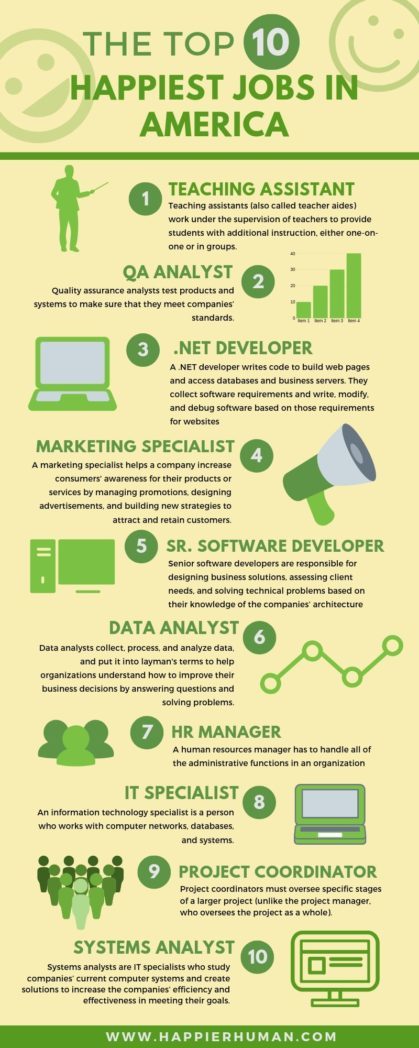There might be affiliate links on this page, which means we get a small commission of anything you buy. As an Amazon Associate we earn from qualifying purchases. Please do your own research before making any online purchase.
Interested in having the happiest job in America?
If so, then you should consider one of the top 10 happiest jobs, as reported by CareerBliss.
People always say, “Find a job you love and you will never have to work a day in your life.” If you are happy with what you do for a living, then you can generally be happy and satisfied in any aspect of your life.
But how does someone become really happy with the job they choose? Well, experts say that there are a lot of factors to consider in order to be happy with your job.
These include your work environment, salary, relationship with superiors and co-workers, growth opportunities, and a lot more.
In the study that CareerBliss conducted, they considered several factors to discover the 10 happiest jobs in America. We dug deeper into these jobs and checked out their descriptions, expected average salaries, and how to land them.
(Side note: Want to find the best career for your personality? Then take this FREE career test that matches your personality and interests to real-world careers)!
What You Will Learn
1. Teaching Assistant
The happiest job in America is a simple teaching assistant. The pay on this rewarding job is not that high (on average), but it is very rewarding because you get to work with children and see them progress.
This shows us, once again, that money is not a driver of happiness. Doctors, lawyers, stockbrokers, architects and other jobs that are are generally considered to be the highest paying jobs in America did not make the list of happiest jobs in America. (Likely the higher stress levels keep these jobs far from this list)

Bliss score: 3.658
Basic overview: Teaching assistants (also called teacher aides) work under the supervision of teachers to provide students with additional instruction, either one-on-one or in groups. With a teaching assistant in the class, a teacher doesn't have to interrupt the flow of the lesson by trying to do multiple things at one time.
Teaching assistants can have a wide variety of duties, ranging from enforcing school rules and teaching proper behavior to help teachers grade papers, taking attendance, preparing the proper materials for lessons, and supervising students throughout the day. While teachers typically introduce any new material to students, teaching assistants to supplement the lessons and help students understand the material by answering questions.
Teachers may look to teaching assistants for feedback regarding their students’ progress. Often, teachers meet with their assistants to discuss lesson plans and pupil development.
Some teaching assistants only work in specific areas of a school. For example, some work in the computer lab, helping students learn how to use software and computers, while others may work as recess attendants, supervising students as they play outside. Teaching assistants may also be specially trained to work with special education students, helping them understand new material by explaining it in a way that is conducive to the students’ learning styles. For young adults with disabilities, teaching assistants may help students learn the necessary skills to gain employment following graduation.
Average salary: $28,641 (Glassdoor).
Education requirement: While some teaching assistants only need a high school diploma and training once they are on the job, having a college degree or completed coursework in child development could open the door to more job opportunities.
How to get started: The requirements to become a teaching assistant vary from state to state, and by the district. In some schools, a high school diploma will suffice, while other schools may require an associate degree. The U.S. Bureau of Labor Statistics notes that schools with Title 1 programs that have a large, low-income population often require an associate degree or at least two years of college. Regardless, you will need some education or experience in assistant teaching or a related subject.
You then must obtain a certification, with varying requirements. For example, in New York, teaching assistants are required to be certified as Level I, II, III, pre-professional, temporary, or continuing teachers' assistants. However, in other states, a teaching assistant must hold a Child Development Associate Credential from the Council for Professional Recognition. This credential is offered with a focus on preschool-aged children and younger. The exam costs around $425 to take.
Some states or schools have additional requirements, such as passing a skills-based test. Teaching assistants may also need to offer proof of a recent physical exam and a negative tuberculosis test, and some schools report that teaching assistants must be certified in first aid and CPR.
It is also best to gain experience through an internship program as a teaching assistant in any school of your choice. You will then need to apply for your license as a teaching assistant. Once licensed, look for job openings in your area, and apply to those you believe you would excel in.
2. QA Analyst
It may surprise some people that a QA analyst is second on the list of happiest jobs in America.

Bliss score: 3.652
Basic overview: Quality assurance analysts test products and systems to make sure that they meet companies’ standards. This includes creating test plans, cases, and scripts to ensure accuracy. The goal of a QA analyst is to make sure that a product or system is reliable, functional, and user-friendly. Many QA analysts work at software companies or collaborate with IT departments, doing system testing to ensure it is top quality and meets system requirements.
Average salary: $60,997 (Glassdoor).
Education requirement: Bachelor of computer science or information technology (or any course related to those).
How to get started: The path to becoming a QA analyst can vary based on the type of work involved. For a QA analyst who works in software development, it might be required to have a degree in computer science, information technology, programming, or a related field. Some other corporations prefer hiring QA analysts with business administration backgrounds.
After obtaining a degree, it is important to get training or certifications to build a strong portfolio. On-the-job training is a critical factor in becoming successful in this career because it is important to learn the details and characteristics of a business and the products that are being dealt with.
Look for job vacancies and apply to open QA analyst positions. Note that some employers require certain certifications, while others may not.
3. .NET Developer
A .net develop seems an obvious choice for one of the happiest jobs in America. It pays well. It allows you a degree of independence. The job sometimes allows you to telecommute. You get to express a degree of creativity and fun problem-solving. If you have the skills to be a .net developer, this is a great choice for a career.

Bliss score: 3.623
Basic overview: A .NET developer writes code to build web pages and access databases and business servers. They collect software requirements and write, modify, and debug software based on those requirements for websites. A .NET developer designs and creates activities and procedures to maintain software applications with the .NET framework. They test and document this software for websites, working alongside designers and content producers.
Average salary: $95,052 (Glassdoor).
Education requirement: Educational requirements may vary, but these professionals should hold a bachelor of computer science, IT, or a related field. Because .NET developers are currently in high demand, some employers may overlook typical educational requirements if a job candidate has extensive experience. The most common requirement is to at least hold an associate degree in web design or a related field.
How to get started: A person applying for a .NET developer position must be a self-motivated, independent worker, but also have the ability to be a strong team player. It is important to be a problem solver and have the ability to think outside of the box. In addition to these skills, one must typically earn a degree in web development or a related field. It is also important to acquire basic skills, such as being familiar with different programming languages (such as C#, F#, and Classic ASP), and to be proficient in programs like Microsoft SQL Server and Oracle.
Once these skills are acquired through training and certifications, it is important to build a portfolio that can clearly communicate your knowledge, skills, and experiences. Then, you must look for job vacancies and apply to open .NET developer positions.
4. Marketing Specialist

Bliss score: 3.464
Basic overview: A marketing specialist helps a company increase consumers' awareness for their products or services by managing promotions, designing advertisements, and building new strategies to attract and retain customers. Marketing specialists focus on consumer motivations when it comes to spending money or taking some kind of action.
While “marketing specialist” is a broad term that could involve many different tasks, one thing that marketing specialists have in common is their need to analyze market data to understand their consumers and identify gaps that create possibilities that could be profitable.
There are a variety of jobs that a marketing specialist can do, from directing teams and creating campaigns to studying consumer purchasing power. The work is driven by the specific industry and company being worked in. For example, a marketing specialist working for a software company may focus on researching the unmet needs of computer users, while a marketing specialist working for a local restaurant might be primarily concerned with ad placement in local media and spreading the word about promotions or specials. It really depends on the company setting, past experience or training, and one's individual interest.
Average salary: $50,528 (Glassdoor).
Education requirement: Bachelor of market research or any related degree (e.g., math, statistics, and computer science).
How to get started: People hoping to become marketing specialists usually start with a bachelor of marketing or any related degree. Many of the most successful marketing specialists go on to earn master’s degrees, typically in business administration or advertising. Some employers will require a master’s degree before they hire someone as a marketing specialist. However, there are also employers that are impressed by extensive experience and outstanding achievements.
If you want to specialize in a specific area of marketing, it is important to get a relevant certification or training to gain an understanding of the specific business principles involved. You also want to make sure that you are a good team player and have a basic understanding of statistics, as it is important to know how to analyze existing trends and make sales predictions for the future. Once these requirements are met, apply for open job positions as a marketing specialist.

5. Sr. Software Developer

Bliss score: 3.454
Basic overview: Senior software developers are responsible for designing business solutions, assessing client needs, and solving technical problems based on their knowledge of the companies’ architecture. They also coordinate, guide, and manage developer teams to ensure projects are completed on time. Senior software developers work with project managers to create timelines for projects and technical directions for new software products.
In order to make it to the “senior” status, one must bring a measurable benefit to the table. The person in this position makes people around them better, has long-term vision, delivers exceptional work, and consistently provides value to the business. One may know all of the cutting-edge functional programming techniques out there, but if you can't communicate effectively with your team, or your focus is not on delivering real value to customers, you are not a senior developer.
Average salary: $95,791 (Glassdoor).

Education requirement: Bachelor of computer science or software engineering (or any related degree).
How to get started: First, getting a degree in computer science, software engineering, or any other similar field is critical. You will then need to acquire the necessary skills to become a junior software developer. This means you have to put time and energy into understanding the “why” of a technology. Why does a problem occur? Why does a framework exist? You need to have a solid idea of the tools that can improve the development life cycle. Rather than focusing on every new release feature of an innovative testing framework, you have to identify the pros and cons of the testing framework and how it can solve an existing problem for the company.
You must also attend training, workshops, and seminars to add to your portfolio and get the experience you need. This involves learning about data structures, algorithms, and higher-level computer science topics. Frameworks and technologies are constantly changing, but the main computer science principles mostly remain the same. Knowing these will give you the necessary foundation for more learning in the future.
If you’re currently in a company and waiting to be promoted, either wait or ask for that well-deserved promotion while continuing to be a good team player. Otherwise, look for available job positions as a senior software developer elsewhere. Senior developers land their roles because they can recognize the needs of the employer or business, and then give them confidence that their problems can be solved. Senior developers are confident to take on new roles, are able to perform under pressure, and recognize that if they don't ask for the job, the answer is going to be “no.”
6. Data Analyst

Bliss score: 3.383
Basic overview: Data analysts collect, process, and analyze data, and put it into layman's terms to help organizations understand how to improve their business decisions by answering questions and solving problems. They identify current trends to make predictions about the future, explain the meaning behind the differences in numbers from year to year, and make suggestions on how to improve these numbers.
Data analysts start with facts and numbers, but they ultimately work to understand what these numbers mean in order to present their findings in an engaging way using graphs, charts, and graphics.
Average salary: $70,965 (Snagajob).
Education requirement: Bachelor of mathematics, statistics, or computer science (or any other related degree).
How to get started: You will need to earn a bachelor of math, statistics, computer science, or any other related degree (with an emphasis on project and database management). You may even want to consider getting a master’s of data science or business analytics degree or a doctoral degree if you want to land a higher-paying job.
You will then want to acquire work experience by joining internship programs, on-the-job training, and field seminars. It is a bit difficult to get a job as a data analyst without work experience. While doing this, you will want to also work on developing strong presentation skills. After analyzing data for a company, you’ll need to be able to communicate your findings with others. Work on explaining complicated information in an approachable and understandable way, and learn to use programs that show the data in a visually clear way.
Look for job openings in the data analyst field, start off your career as a statistical assistant or technician, and accept entry-level jobs to gain experience.
7. HR Manager

Bliss score: 3.369
Basic overview: A human resources manager has to handle all of the administrative functions in an organization. This may include recruiting, interviewing, hiring, training, team building, strategic planning, performance updates, policies, salary, benefits, and employee safety. They act as a liaison between the employees and the company. The HR manager is also responsible for creating a work environment that motivates and retains employees.
Average salary: $80,663 (Resources).
Education requirement: Bachelor of human resources management or business administration (or any other related degree).
How to get started: Obtain a bachelor of human resources management degree or any other similar degree. You may also choose to continue your education to earn your master’s of human resources degree. It is best to gain experience by completing an internship program or getting some other kind of on-the-job training in an entry-level position, such as an HR assistant or an HR specialist, so you can gain real-life experience. You can also join organizations to widen your networks. Aside from adding a master’s degree to your education, you will also want to look into obtaining certifications from different human resources organizations.
When you feel competent, apply for an HR manager position either in the company you’re working for, or another one. Some companies require a five-year minimum of work experience as an HR assistant/generalist for your application to be considered for an HR manager position.
8. IT Specialist

Bliss score: 3.364
Basic overview: An information technology specialist is a person who works with computer networks, databases, and systems. Many companies have IT specialists on staff to help maintain the computers and computer networks for the organizations. If a server becomes dysfunctional, an IT specialist must identify and diagnose the problem, such as a failed motherboard. The specialist must then be able to take the appropriate steps to correct the problem.
IT specialists often correct software problems by installing fixes for software released by a manufacturer, or by uninstalling and reinstalling software that is malfunctioning. The person in this position also helps to fix individual technical issues that employees run into.
Average salary: $56,139 (Glassdoor).
Education requirement: Bachelor of computer science or information science (or other related degrees). Some companies prefer a master’s degree.
How to get started: Complete your relevant bachelor's degree and consider doing so at a school that specializes in computer-related courses. If possible, continue on to obtain your master’s degree. While obtaining your degree, take advantage of the computer lab resources available at your institution. Some schools offer sophisticated computer labs for their students that give an opportunity to experience hands-on training with the programs and software that are used on a day-to-day basis by IT specialists. To get additional experience, attend seminars, workshops, and on-the-job training, or complete an internship program.
Also, consider obtaining certification. Though this is not a requirement to enter this field, it can help demonstrate your skill and experience to potential employers. Employers also often require their IT specialists to be experts in specific products, such as Cisco, Oracle, and Microsoft.
Gain as much professional work experience as you can from smaller organizations. Larger corporations typically require three to five years of experience before hiring an IT specialist.
9. Project Coordinator

Bliss score: 3.267
Basic overview: Project coordinators must oversee specific stages of a larger project (unlike the project manager, who oversees the project as a whole). Project coordinators may oversee several different aspects of a project, or may just focus on one.
The project coordinator tracks the stages of their focus throughout the project's life cycle, and they make sure that critical information is shared with the necessary team members. Project coordinators may need to oversee the workforce, monitor the development of the project, track schedules, and create reports.
Average salary: $88,270.
Education requirement: Though there often are no degree requirements beyond a high school diploma, having a bachelor’s degree makes it easier for job candidates to get hired. A degree in communications, business management, or similar fields is sufficient. Employers also look for candidates with expertise in the software used in the field, so certifications in PRINCE2, Microsoft Office, or Primavera are also beneficial.
How to get started: After getting your high school diploma or bachelor of business administration (or any other related degree), it is best to complete an internship program or get some on-the-job training. Many employers require job candidates to have a couple of years of experience working at an administrative or managerial level before hiring them to be the project coordinator. It is beneficial to find entry-level employment opportunities in a related area or your chosen field of expertise, such as construction, engineering, or IT, to gain some experience.
Get a certificate to advance your career to a project coordinator. Some certifications in this field include the Certified Associate in Project Management (CAPM), Project Management Professional (PMP), and PMI Scheduling Professional (PMI-SP) credentials.
10. Systems Analyst

Bliss score: 3.245
Basic overview: Systems analysts are IT specialists who study companies’ current computer systems and create solutions to increase the companies’ efficiency and effectiveness in meeting their goals. They help bring business and IT together by understanding and communicating the needs and limitations of both.
Average salary: $68,807 (Glassdoor).
Education requirement: Bachelor of computer systems analysis, computer science, or computer information systems (or other related degrees).
How to get started: After obtaining your bachelor's degree, you may want to consider taking a business course as well so you can learn to understand the needs of businesses and gain some managerial skills.
Join internship programs to gain some work experience or participate in on-the-job training. Take advantage of any seminars and workshops in your area as well so you can add that knowledge to your portfolio. If possible, continue your education to earn a master’s degree that is specifically related to computer science to land a job as a systems analyst.
What DO YOU THINK are the Happiest Jobs in America?
As it turns out, happiness can be found in the workplace—it’s just a matter of finding the joy in any task you need to accomplish. There is nothing more blissful than being happy with what you are doing, particularly if you’re earning money while you are doing it.
We have listed the 10 happiest jobs in the United States. If you’re still undecided about what career to pursue, you might want to consider these options and see if they will fit your need to survive and be happy.
However, this does not mean that they are your only options. If you feel like you’ll be happier being a research assistant than a teaching assistant, then do so. What is most important is that you enjoy the work you do.
Choose to be a happier human. Find the job that best suits you.
Finally, if you want to find the best career for your personality, then take this FREE career test that matches your personality and interests to real-world careers.
Was this article helpful?
Share the happiness on your favorite social media network, and let your friends choose among these job options!


